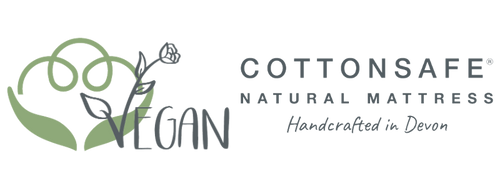 We have been featured in the latest publication of the Wicked Leeks magazine by Riverford Organic Farmers. The article explores the places other than your food where you are exposed to the use of pesticides. They echo our call for more transparency on the chemicals used in our every day lives.
We have been featured in the latest publication of the Wicked Leeks magazine by Riverford Organic Farmers. The article explores the places other than your food where you are exposed to the use of pesticides. They echo our call for more transparency on the chemicals used in our every day lives.
In your bed
" Mark Dowen was making futons in the 80s when he first came across the concept of chemical flame retardants. “Suddenly we were told we had to buy cotton that was covered with fire retardants,” he recalls. “We couldn’t understand it because cotton doesn’t burn very well, it smoulders. Years later, I started my own business and again had to use these coatings. We were told by the supplier that the product was safe, but I wasn’t happy with that.” Under the Furniture Fire Regulation Bill passed in 1988, all mattresses and soft furnishings in the UK have to meet a fire retardancy standard, which they achieve by coating fabrics in chemicals including polybrominated diphenyl ethers (PBDEs), Chlorinated Tris, and organophosphates. The latter group has been almost completely banned for use in agriculture due to toxicity to the natural environment and humans, with the exception of glyphosate, which has been classed as ‘probably carcinogenic’ and faces ongoing calls for removal. Organophosphates in fire retardants have specific irritation to eyes, as well as risk to central nervous system and bone strength, with flame retardants as a whole “found to be persistent, bio-accumulative and toxic to humans and wildlife”. Dowen’s shock at his findings had been repeated years earlier in the US, when researchers found traces of flame retardant in childrens’ urine after they wore pyjamas coated in it after only one night. “I started from scratch and just started reading about it – many of these chemicals are carcinogenic,” says Dowen, who says when he tried to bring the issue to parliamentary attention, he got little reaction. “Nobody cared that when you make a mattress you’re basically making a bellows and it’s got air inside, so when you sit on it, it puffs this stuff out. If you sweat on it, it turns into a semi liquid state that is absorbed by skin.” As scrutiny grew, some flame retardants were banned due to health concerns, such as Deca-BDE, which was classed as a ‘Substance of Very High Concern’ and banned in 2019. An Environmental Audit Committee (EAC) report from that year states that: “Regrettable substitution occurred as it was replaced with flame retardants which are now being considered for restriction.” Disposal is another issue as these chemicals degrade into other hazardous forms, and release toxins when burnt through incineration for energy – another reason why their role as flame retardants should be questioned, says Dowen. Despite concerns and growing restrictions internationally, there has been little noise in the UK. The EAC report states that: “It is clear that opposition from some in the furniture and flame-retardant industries, and protection of their market share, also contributed to the inability to achieve a consensus for reform.” In the meantime, Dowen continues to campaign and raise awareness, alongside making and selling his patented ‘Cottonsafe® Natural Mattresses’, a product he created by weaving naturally flame retardant wool around cotton. "

